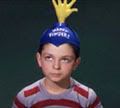Max Roach: 1924-2007
Max Roach, a founder of modern jazz who rewrote the rules of drumming in the 1940's and spent the rest of his career breaking musical barriers and defying listeners' expectations, died early Thursday in New York. He was 83.
His death was announced Thursday by a spokesman for Blue Note records, on which he frequently appeared. No cause was given. Roach had been known to be ill for several years.
As a young man, Roach, a percussion virtuoso capable of playing at the most brutal tempos with subtlety as well as power, was among a small circle of adventurous musicians who brought about wholesale changes in jazz. He remained adventurous to the end.
Over the years he challenged both his audiences and himself by working not just with standard jazz instrumentation, and not just in traditional jazz venues, but in a wide variety of contexts, some of them well beyond the confines of jazz as that word is generally understood.
He led a "double quartet" consisting of his working group of trumpet, saxophone, bass and drums plus a string quartet. He led an ensemble consisting entirely of percussionists. He dueted with uncompromising avant-gardists like the pianist Cecil Taylor and the saxophonist Anthony Braxton. He performed unaccompanied. He wrote music for plays by Sam Shepard and dance pieces by Alvin Ailey. He collaborated with video artists, gospel choirs and hip-hop performers.
Roach explained his philosophy to The New York Times in 1990: "You can't write the same book twice. Though I've been in historic musical situations, I can't go back and do that again. And though I run into artistic crises, they keep my life interesting."
More here.
His death was announced Thursday by a spokesman for Blue Note records, on which he frequently appeared. No cause was given. Roach had been known to be ill for several years.
As a young man, Roach, a percussion virtuoso capable of playing at the most brutal tempos with subtlety as well as power, was among a small circle of adventurous musicians who brought about wholesale changes in jazz. He remained adventurous to the end.
Over the years he challenged both his audiences and himself by working not just with standard jazz instrumentation, and not just in traditional jazz venues, but in a wide variety of contexts, some of them well beyond the confines of jazz as that word is generally understood.
He led a "double quartet" consisting of his working group of trumpet, saxophone, bass and drums plus a string quartet. He led an ensemble consisting entirely of percussionists. He dueted with uncompromising avant-gardists like the pianist Cecil Taylor and the saxophonist Anthony Braxton. He performed unaccompanied. He wrote music for plays by Sam Shepard and dance pieces by Alvin Ailey. He collaborated with video artists, gospel choirs and hip-hop performers.
Roach explained his philosophy to The New York Times in 1990: "You can't write the same book twice. Though I've been in historic musical situations, I can't go back and do that again. And though I run into artistic crises, they keep my life interesting."
More here.













0 Comments:
Post a Comment
<< Home